Algeria’s cuisine has undergone a fascinating transformation throughout its rich history, reflecting the diverse influences shaping its past and present diets. Influenced by Arab, Amazigh, Turkish, and French culinary traditions, Algerian cuisine is a vibrant tapestry of flavours and ingredients. From traditional dishes like couscous with meat and vegetable stew, mutton, lamb, and poultry, to delectable desserts made with figs, dates, almonds, and honey, Algerian cuisine offers a tempting array of tastes. The practice of veiling has seen an increase in urban areas, showcasing the cultural nuances of this North African country. Algerians also delight in iconic dishes such as brik, merguez, and hearty lamb or chicken stew. And no Algerian meal is complete without a cup of tea, with mint tea being a particular favourite among locals.
Key Takeaways:
- Algerian cuisine is influenced by various traditions, including Arab, Amazigh, Turkish, and French culinary practices
- Traditional Algerian dishes include couscous with meat and vegetable stew, mutton, lamb, poultry, and desserts featuring figs, dates, almonds, and honey
- Brik and merguez are iconic Algerian dishes, along with hearty lamb or chicken stew
- Religious and secular holidays play a significant role in shaping Algerian diets, and tea, especially mint tea, is a popular beverage
- Algerian culture has been shaped by historical events, including colonial rule, the independence struggle, and post-independence policies. The clash between traditional and global culture is an ongoing debate.
Influences on Algerian Cuisine
Algerian cuisine is a vibrant fusion of Arab, Amazigh, Turkish, and French culinary traditions, resulting in a rich tapestry of flavours and dishes that have become synonymous with Algeria’s cultural identity. From ancient times to the present day, the diverse influences on Algerian cuisine have shaped the country’s traditional foods and national dishes.
The Arab influence on Algerian cuisine dates back centuries. Arab traders and settlers brought with them a variety of spices, such as cumin and ginger, which are now integral to Algerian cooking. The Amazigh people, the indigenous population of Algeria, have also played a significant role in shaping the country’s culinary heritage. Traditional Algerian dishes often feature ingredients like couscous, mutton, lamb, and poultry, reflecting the Amazigh emphasis on agriculture and livestock rearing.
Over the years, Algeria’s proximity to Turkey and its historical ties with the Ottoman Empire have contributed to the introduction of Turkish culinary elements. Algerian cuisine showcases the use of Turkish spices and cooking techniques, adding depth and variety to the flavours. Additionally, the French colonial period in Algeria, which lasted for over a century, had a lasting impact on the country’s culinary traditions. French influence can be seen in the French-style bakeries, pastries, and desserts that have become popular in Algeria.
The array of influences on Algerian cuisine has resulted in a diverse range of traditional foods that reflect the country’s history and culture. From the fragrant spices of Arab cuisine to the hearty stews of Amazigh heritage and the delicate pastries influenced by French cooking, Algerian cuisine has something to offer every palate.

| Arab Influences | Amazigh Influences | Turkish Influences | French Influences |
|---|---|---|---|
| Cumin | Couscous | Spices | Bakeries |
| Ginger | Mutton | Cooking techniques | Pastries |
| Seafood | Lamb | – | Desserts |
Traditional Algerian Dishes
Traditional Algerian cuisine boasts an array of mouth-watering dishes, with couscous served alongside hearty meat and vegetable stews, succulent mutton, lamb, and poultry, and delectable desserts enriched with figs, dates, almonds, and honey. Algerian cuisine is a blend of diverse culinary traditions, influenced by Arab, Amazigh, Turkish, and French cultures. These influences have shaped the country’s food culture, resulting in a rich and flavorful array of traditional dishes.
Couscous, a staple in Algerian cuisine, is typically accompanied by a hearty stew made with various meats and vegetables. Mutton, lamb, and poultry are frequently used to create savoury and tender dishes that are enjoyed across the country. Algerians also have a sweet tooth and indulge in desserts made with local ingredients such as figs, dates, almonds, and honey. These desserts offer a delightful combination of flavours and textures.
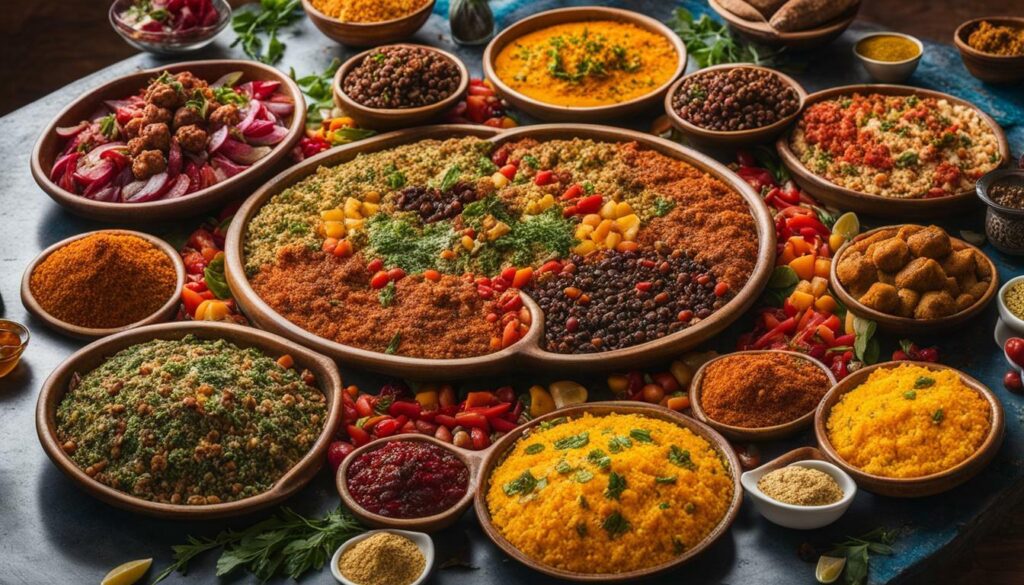
Some other notable traditional Algerian dishes include brik, a fried pastry filled with various ingredients, and merguez, spicy lamb or beef sausages. These dishes showcase the diverse flavours and spices that Algerian cuisine is known for. Additionally, lamb and chicken stews are popular and often enjoyed during family gatherings and special occasions.
Traditional Algerian Dishes:
| Dish | Description |
|---|---|
| Couscous | A traditional Algerian dish made with semolina served alongside meat and vegetable stew. |
| Brik | A fried pastry filled with ingredients such as eggs, meat, and vegetables. |
| Merguez | Spicy lamb or beef sausages commonly enjoyed in Algerian cuisine. |
| Mutton, Lamb, and Poultry | Succulent and tender meat dishes that are integral to Algerian cuisine. |
These traditional dishes, along with many others, are a true reflection of Algerian culture and heritage. They are enjoyed not only for their delicious flavours but also for their significance in bringing families and communities together to share meals and create lasting memories.
Iconic Algerian Recipes
Algerian cuisine is renowned for its iconic recipes, such as the crispy and flavorful brik pastry and the fiery merguez sausages, while hearty lamb and chicken stews continue to delight palates across the country. The brik, a fried pastry filled with various ingredients, is a popular street food in Algeria. It is traditionally filled with a mixture of tuna, egg, and herbs, then folded into a triangle shape and deep-fried until golden and crispy. The brik is often served as an appetizer or snack, and its savoury and satisfying flavour makes it a favourite among locals and visitors alike.
The merguez sausages are another staple of Algerian cuisine. These spicy lamb or beef sausages are bursting with flavour and are often enjoyed grilled or pan-fried. Made with a blend of ground meat, spices like cumin and paprika, and a hint of chilli, merguez sausages are a popular choice for barbecues and street food vendors. Their vibrant red colour and smoky aroma make them hard to resist, and they add a fiery kick to any meal.
To experience the heartiness of Algerian cuisine, look no further than the lamb and chicken stews. These slow-cooked dishes are typically prepared with a rich blend of spices, including cumin, ginger, and saffron, resulting in a warm and fragrant flavour profile. Tender pieces of meat are simmered with vegetables like potatoes, carrots, and tomatoes, creating a comforting and satisfying meal. These stews are often accompanied by couscous, which is widely considered the national dish of Algeria.
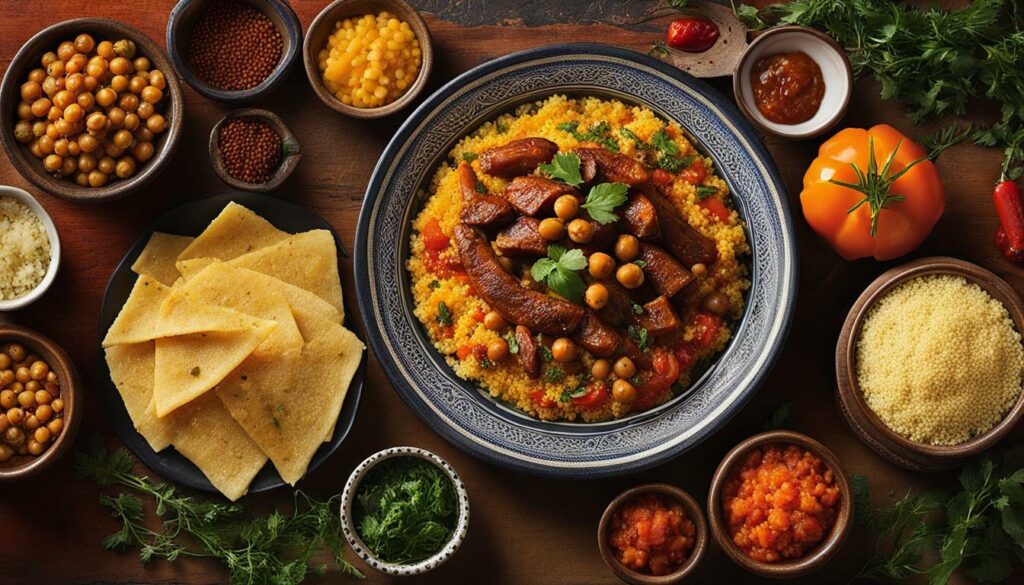
The Essence of Algerian Cuisine
- Crispy and flavorful brik pastry
- Fiery merguez sausages
- Hearty lamb and chicken stews
These iconic Algerian recipes showcase the rich flavours and cultural influences that have shaped Algerian cuisine throughout history. From the diverse culinary traditions of Arab, Amazigh, Turkish, and French cultures to the vibrant spices and ingredients used in Algerian dishes, the country’s food reflects its unique heritage. Whether you’re enjoying a brik on the streets of Algiers, savouring the spiciness of merguez sausages, or indulging in a comforting lamb or chicken stew, the flavours of Algerian cuisine will transport you to the heart of this North African nation.
| Iconic Algerian Recipes | Description |
|---|---|
| Brik Pastry | A crispy and flavorful fried pastry filled with ingredients like tuna, egg, and herbs. |
| Merguez Sausages | Spicy lamb or beef sausages bursting with flavour, often enjoyed grilled or pan-fried. |
| Lamb and Chicken Stews | Slow-cooked dishes with tender meat and a rich blend of spices, served with couscous. |
Cultural Factors Shaping Algerian Diets
Algerian diets are heavily influenced by cultural traditions, with festive foods enjoyed during religious and secular holidays, while the strong influence of Islam shapes traditional values and sparks discussions on the impact of global culture. Festive foods in Algeria play a significant role in celebrating religious and secular occasions. These occasions provide an opportunity for families and communities to come together and indulge in special delicacies that are prepared with love and care.
“Food is an integral part of our celebrations and brings people closer,” says Fatima, a young Algerian mother. “During Eid al-Fitr, we prepare dishes such as lamb couscous, harira soup, and Algerian sweets like makroud and shebakia. These dishes have been passed down through generations and hold deep cultural significance.”
Furthermore, the influence of Islam in Algeria is evident in the country’s traditional values, including those related to food. The practice of fasting during Ramadan, for example, fosters discipline and self-control. Algerians break their fast with iftar, a meal that typically consists of dates, soup, various appetizers, and a main course. This meal not only replenishes the body but also symbolizes the unity and solidarity of the Algerian people.
| Festive Occasion | Popular Foods |
|---|---|
| Eid al-Fitr | Lamb couscous, harira soup, makroud, shebakia |
| Eid al-Adha | Roasted lamb, mechoui, tajine |
| Mouloud | Haleem, couscous, berkoukes |
The clash between traditional and global culture is another factor that shapes Algerian diets. With increasing exposure to global trends and the influence of media, Algerians are adopting new dietary practices and incorporating foreign cuisines into their daily lives. However, this phenomenon has sparked discussions and debates on the preservation of traditional Algerian foods and the potential loss of cultural identity.
As Algerians navigate the delicate balance between tradition and modernity, they continue to cherish their rich culinary heritage. The diverse flavours, spices, and ingredients used in Algerian cuisine reflect the country’s history, cultural influences, and vibrant traditions. From fragrant couscous to tantalizing lamb merguez, Algerian cuisine invites you on a journey of taste and tradition.
“Algerian cuisine is a reflection of our rich cultural heritage, where centuries of tradition converge to create flavors that are both familiar and unique.” – Chef Rachida, a renowned Algerian culinary expert
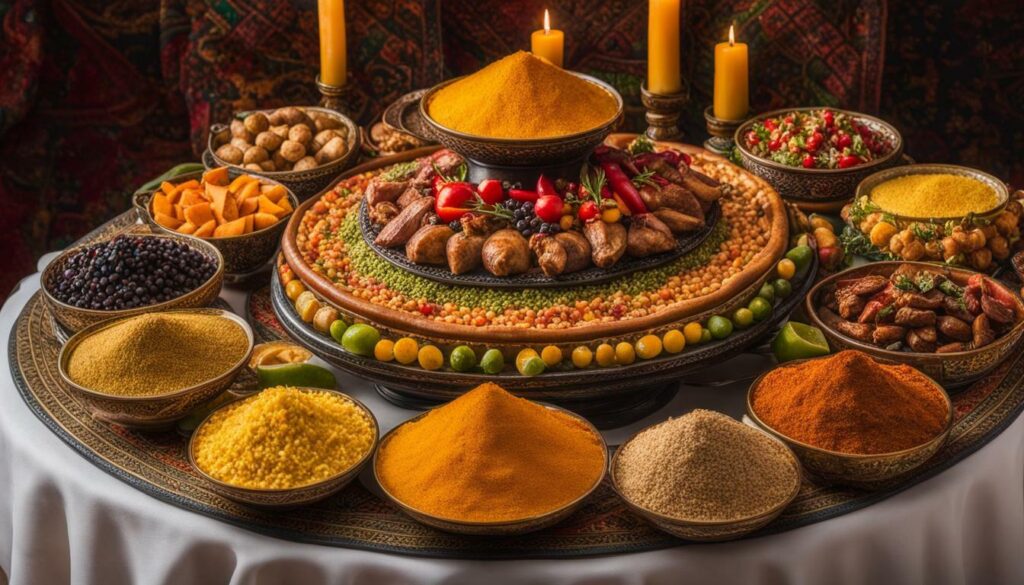
The Evolution of Algerian Cuisine
Algerian cuisine has evolved through centuries of historical events, including the impact of colonial rule, the struggle for independence, and subsequent policies, while Algerian literature and film have played a crucial role in celebrating the country’s culinary heritage. The diverse influences of Arab, Amazigh, Turkish, and French culinary traditions have shaped Algerian cuisine into a unique blend of flavours and ingredients.
During the colonial period, French influence introduced new ingredients and cooking techniques to Algerian cuisine, resulting in a fusion of traditional Algerian dishes with French culinary styles. This fusion gave birth to iconic recipes like the brik, a fried pastry filled with various ingredients, and merguez, spicy lamb or beef sausages. Algerians also embraced French staples such as bread, coffee, and pastries, incorporating them into their daily meals.
Following Algeria’s struggle for independence, the nation’s leaders placed an emphasis on preserving and promoting Algerian culture, including its cuisine. Literature and film became powerful tools in showcasing Algerian traditions, and renowned authors and filmmakers depicted the rich culinary heritage of the country in their works. Algerian literature, with its vivid descriptions of food and dining customs, transported readers to the heart of traditional Algerian kitchens, while films brought the vibrant colours and flavours of Algerian dishes to the big screen.
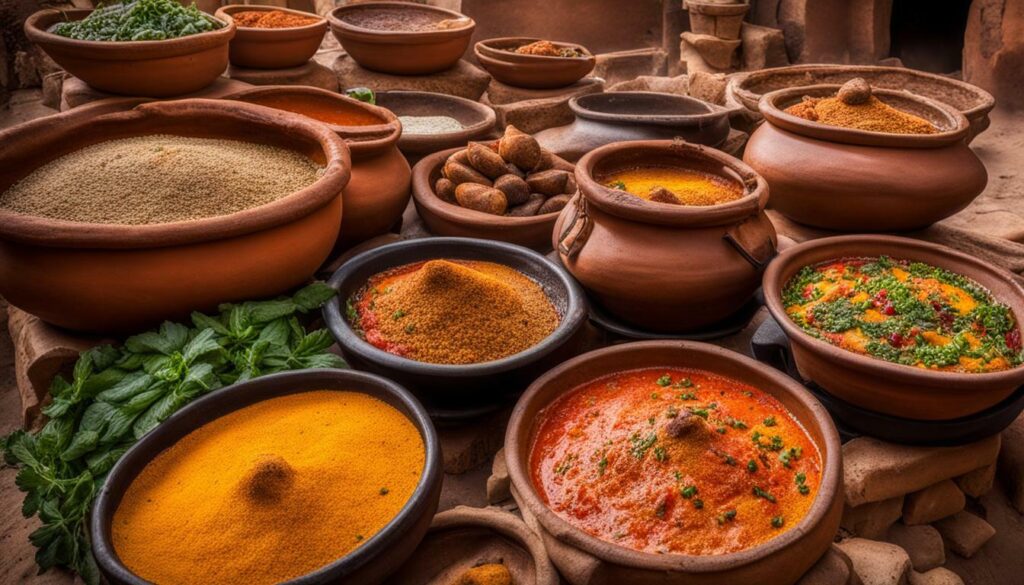
The ongoing debate between traditional and global culture in Algeria has also influenced the evolution of Algerian cuisine. While Algerians embrace their traditional dishes and local ingredients, the country’s urban areas have witnessed a rise in global influences and a greater variety of international cuisines. This clash between tradition and modernity has sparked discussions about preserving Algerian culinary heritage while embracing culinary diversity.
Algerian Literature and Film: Preserving the Culinary Heritage
Algerian literature and film have played a significant role in preserving and promoting the country’s culinary heritage. Notable works, such as Yasmina Khadra’s “The Swallows of Kabul” and “The Attack,” showcase the cultural significance of traditional Algerian dishes and the rituals associated with food preparation and consumption. Similarly, films like “Couscous” by Abdellatif Kechiche and “Zabana!” by Saïd Ould-Khelifa bring Algerian cuisine to life on the big screen, highlighting the flavours and aromas that have defined Algerian cooking for centuries.
Throughout the years, Algerian cuisine has remained resilient, adapting to historical events and cultural influences while preserving its traditional roots. The use of spices like red chillies, cumin, and ginger, the inclusion of seafood, fish, lamb, and chicken in various dishes, and the popularity of tea, especially refreshing mint tea, are all elements that contribute to the unique and flavorful Algerian culinary experience. Algerian cuisine continues to be a source of pride and a reflection of the country’s rich cultural heritage.
| Colonial Influences | Struggle for Independence | Modern Cultural Debates |
|---|---|---|
| – French fusion recipes like brik and merguez | – Emphasis on preserving Algerian culture, including cuisine | – Clashing traditional and global influences |
| – Incorporation of French staples into Algerian meals | – Literature and film showcasing culinary heritage | – Rise of international cuisines in urban areas |
| – Introduction of new ingredients and cooking techniques | – Cultural significance of traditional Algerian dishes in works | – Discussions on preserving heritage while embracing diversity |
Spices and Ingredients in Algerian Cuisine
Spices like red chillies, cumin, and ginger add a distinctive kick to Algerian dishes, whether it’s the tantalizing flavours of seafood, fish, lamb, and chicken, or the aromatic blend of herbs and spices found in traditional Algerian recipes. These spices not only enhance the taste but also reflect the cultural richness of Algerian cuisine.
In addition to the vibrant spices, Algerian cuisine utilizes a variety of ingredients that contribute to its unique flavours. Seafood, fish, lamb, and chicken are commonly used meats that feature prominently in Algerian dishes. These proteins are often cooked with a combination of vegetables, resulting in hearty and flavorful stews that are loved by locals and visitors alike.
The use of local produce is also an important aspect of Algerian cuisine. Fresh herbs like coriander and mint are widely used to enhance the taste and aroma of dishes. Algerian recipes also make use of indigenous ingredients such as figs, dates, almonds, and honey, which not only add sweetness but also evoke the rich natural bounty of the region.
| Spices | Ingredients |
|---|---|
| Red chilies | Seafood |
| Cumin | Fish |
| Ginger | Lamb |
| Chicken |
In Algerian cuisine, the combination of spices and ingredients creates a harmonious symphony of flavors that has captivated food enthusiasts worldwide. The tantalizing aroma and robust taste of Algerian dishes reflect the rich culinary traditions and cultural heritage of this North African country.

Algerian Beverages
Algeria’s culinary culture extends beyond food to include the nation’s favourite beverages, with tea, particularly the invigorating mint tea, stealing the spotlight. Known as “atai” or “whiskey berbère,” this aromatic drink is a staple in Algerian households and social gatherings. Prepared by steeping fresh mint leaves and green tea in boiling water, it is then sweetened with sugar. The distinctive combination of minty freshness and delicate sweetness makes mint tea a refreshing choice, whether served hot or cold. Algerians often enjoy this beloved beverage throughout the day, sipping it slowly while engaging in lively conversations or partaking in special celebrations.
Accompanying Algeria’s vibrant culinary scene is the national dish, couscous. This traditional staple, made from semolina grains and steamed to fluffy perfection, holds a special place in Algerian cuisine. It is often served alongside succulent meat, aromatic vegetables, and flavorful sauces. The art of making couscous is taken seriously, with families passing down their cherished recipes from one generation to the next. Its significance extends beyond the dinner table, as it symbolizes unity, hospitality, and the essence of Algerian identity.

Algerian Cuisine: A Flavorful Melting Pot
Algerian cuisine is a testament to the country’s rich history and cultural diversity. Influenced by Arab, Amazigh, Turkish, and French traditions, Algerian dishes boast a unique blend of flavours and techniques. Spices such as red chillies, cumin, and ginger infuse dishes with warmth and depth. Seafood, fish, lamb, and chicken are commonly used ingredients, reflecting the country’s diverse landscapes and culinary preferences. Algerian cuisine showcases the skilful use of local produce like figs, dates, almonds, and honey in an array of delectable desserts.
While Algerian cuisine continues to evolve, it remains deeply rooted in tradition. The nation’s culinary heritage is celebrated through iconic recipes like brik, a delicious fried pastry filled with a variety of ingredients, and merguez, the spicy lamb or beef sausages that add a fiery kick to any meal. Traditional dishes such as couscous with meat and vegetable stew, mutton, lamb, and poultry are a testament to the enduring love for classic Algerian flavours.
Despite the influences of globalization, Algerians hold steadfast to their culinary roots. The clash between traditional and global culture is a subject of ongoing debate, highlighting the significance of food as a cultural marker. In Algeria, mealtimes are not merely about sustenance; they are a time for families and friends to gather, share stories, and preserve their cultural heritage.
Table: Algerian Culinary Influences
| Culinary Traditions | Influences |
|---|---|
| Arab | Introduced spices, cooking techniques, and staple ingredients |
| Amazigh | Contributed native ingredients, such as dates and almonds |
| Turkish | Influenced techniques for preparing meat and pastries |
| French | Introduced ingredients like tomatoes and potatoes |
Arts and Culture in Algeria
Islam permeates the fabric of Algerian society, shaping traditional values, while the arts, including diverse music genres like raï and Wahrani, as well as literature and film, showcase Algeria’s rich cultural tapestry, albeit sometimes facing obstacles from extremist groups.
The influence of Islam in Algeria is evident in the country’s traditional values and societal norms. Islamic teachings guide everyday life, from personal conduct to family dynamics. Modesty and the practice of veiling have become more prevalent, particularly in urban areas. Algerians hold religious and secular holidays in high regard, celebrating with feasts and traditional dishes that reflect their cultural heritage.
The arts play a significant role in Algerian culture, serving as a medium for self-expression and storytelling. Algerian literature, spanning from the works of writers like Assia Djebar and Yasmina Khadra to the poetry of the famed Mahmoud Darwish, explores themes of identity, history, and societal changes. This literary richness has earned Algeria recognition as a country with a strong literary tradition.
The Algerian film industry has also made its mark on the global stage. Renowned directors such as Rachid Bouchareb and Tariq Teguia have produced critically acclaimed works that shed light on Algeria’s history, struggles, and cultural diversity. However, some artists have faced challenges and opposition from extremist groups, who view certain art forms as contrary to their strict interpretation of Islamic principles.
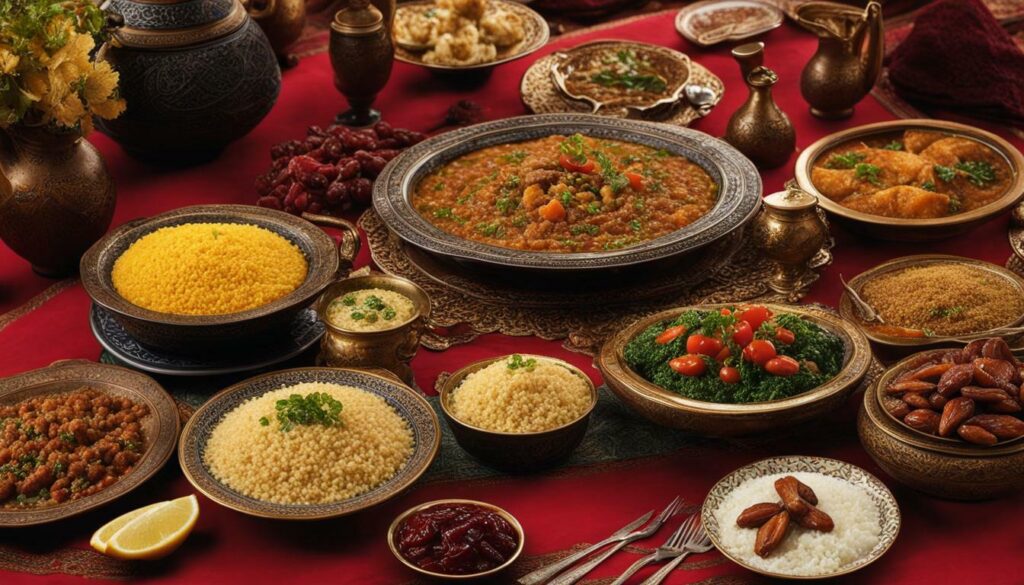
In the realm of music, Algeria boasts a vibrant and diverse scene. Raï, a genre originating from Oran, combines elements of traditional Algerian folk music with Western influences, creating a unique fusion. Wahrani, another popular music genre, hails from the city of Wahran (Oran). Both raï and Wahrani serve as outlets for social commentary and emotional expression, capturing the collective experiences of the Algerian people.
Despite the challenges faced by artists, Algeria’s arts and culture continue to thrive. They embody the resilience and creativity of a nation that has weathered a complex history. Through their work, Algerian artists preserve the country’s cultural heritage and contribute to a global understanding of Algerian society.
Conclusion
The exploration of past and present diets of Algeria highlights the intricate blend of cultural influences, traditional recipes, and contemporary culinary trends that have shaped Algerian cuisine into the captivating and diverse tapestry it is today.
Algerian cuisine draws inspiration from a rich history of Arab, Amazigh, Turkish, and French culinary traditions, resulting in a fusion of flavours and techniques that are uniquely Algerian. Traditional dishes such as couscous with meat and vegetable stew, mutton, lamb, and poultry showcase the country’s love for hearty and flavorful meals. Desserts made with local ingredients like figs, dates, almonds, and honey provide a delightful end to any Algerian feast.
Iconic Algerian recipes like brik, a fried pastry filled with various ingredients, and merguez, spicy lamb or beef sausages, exemplify the diverse culinary offerings of the country. Additionally, lamb and chicken stews feature prominently in Algerian cuisine, providing comfort and satisfaction to diners.
Cultural factors, including religious and secular holidays, have a significant impact on Algerian diets. The practice of veiling has seen an increase in urban areas, reflecting the influence of Islamic traditions. Algerians also have a fondness for tea, especially the refreshing and fragrant mint tea, which is a staple beverage in the country.
Algerian culture has been shaped by colonial rule, the struggle for independence, and post-independence policies. The clash between traditional and global culture remains a subject of debate, with Algerians grappling to preserve their heritage while embracing modernity. The influence of Islam is pervasive in Algerian society, promoting traditional values and influencing social norms.
In the realm of arts and culture, various music genres like raï and Wahrani have captured the hearts of Algerians, representing their vibrant spirit and creativity. Algerian literature and film have also produced notable works that showcase the country’s rich cultural tapestry, although some artists have faced opposition from Islamic extremists.
Algerian cuisine is known for its bold and aromatic flavours, thanks to the use of spices such as red chillies, cumin, and ginger. Seafood, fish, lamb, and chicken are common ingredients in Algerian dishes, adding depth and variety to the culinary offerings. Above all, couscous holds the esteemed status of being the national dish of Algeria, representing the heart and soul of Algerian cuisine.
The exploration of Algerian diets reveals a captivating journey through history, culture, and flavours. From its ancient roots to the present day, Algerian cuisine continues to evolve, delighting both locals and visitors alike with its rich and diverse culinary traditions.
FAQ
What are the main influences on Algerian cuisine?
Algerian cuisine is influenced by Arab, Amazigh, Turkish, and French culinary traditions.
What are some traditional Algerian dishes?
Traditional Algerian dishes include couscous with meat and vegetable stew, mutton, lamb, and poultry. Algerian desserts often feature figs, dates, almonds, and honey.
What are some iconic Algerian recipes?
Some iconic Algerian recipes include brik (a fried pastry filled with various ingredients), merguez (spicy lamb or beef sausages), and lamb or chicken stew.
How have cultural factors shaped Algerian diets?
Cultural factors, including religious and secular holidays, influence Algerian diets. Islam also plays a strong role in supporting traditional values.
How has the evolution of Algerian cuisine been influenced?
Algerian cuisine has been influenced by colonial rule, the struggle for independence, and post-independence policies. Algerian literature and film have also played a role in promoting the country’s culinary heritage.
What spices and ingredients are commonly used in Algerian cuisine?
Algerian cuisine often includes spices such as red chillies, cumin, and ginger. Seafood, fish, lamb, and chicken are commonly used ingredients.
What are popular beverages in Algeria?
Tea, especially mint tea, is a popular beverage in Algeria.
What is the role of Islam in Algerian society?
Islam has a strong influence on Algerian society, supporting traditional values.
What are some popular music genres in Algeria?
Popular music genres in Algeria include raï and Wahrani.
How have Algerian arts and culture been impacted?
Algerian literature and film have produced notable works. However, some artists have faced opposition from Islamic extremists.
Source Links
- https://www.britannica.com/place/Algeria/Cultural-life
- https://www.mediterraneanliving.com/all-about-authentic-algerian-cuisine/
- https://globalnutritionreport.org/resources/nutrition-profiles/africa/northern-africa/algeria/



